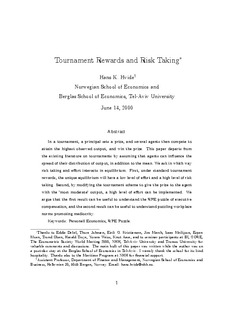| dc.description.abstract | In a tournament, a principal sets a prize, and several agents then compete to attain the highest observed output, and win the prize. This paper departs from the existing literature on tournaments by assuming that agents can influence the spread of their distribution of output, in addition to the mean. We ask in which way risk taking and effort interacts in equilibrium. First, under standard tournament rewards, the unique equilibrium will have a low level of effort and a high level of risk taking. Second, by modifying the tournament scheme to give the prize to the agent with the ’most moderate’ output, a high level of effort can be implemented. We argue that the first result can be useful to understand the RPE puzzle of executive compensation, and the second result can be useful to understand puzzling workplace norms promoting mediocrity. | en |
